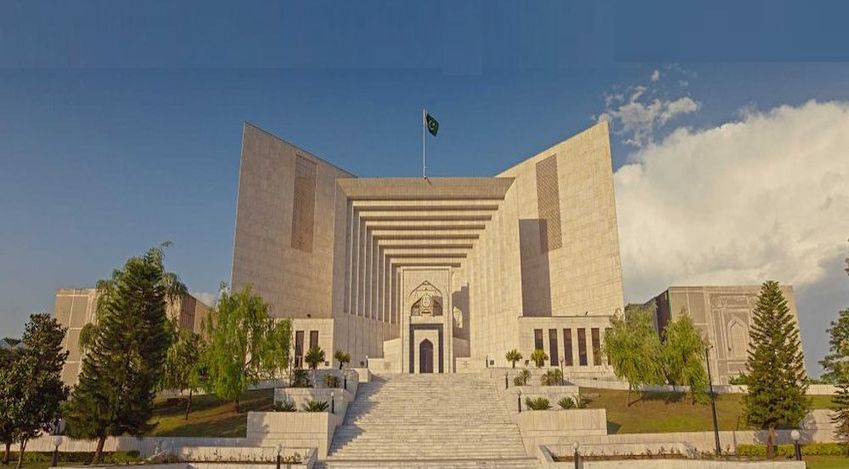Supreme Court of Pakistan Sets Aside Disproportionate Disciplinary Penalty in Civil Service Case
Islamabad 07-03-2025: In a landmark ruling, the Supreme Court of Pakistan has set aside the compulsory retirement of a Civil Servant, Petitioner imposed by the Board of Intermediate and Secondary Education, Rawalpindi (BISE). The Court ruled that the penalty was disproportionate to the alleged misconduct of 48 days’ unauthorized absence from duty and directed the competent authority to reassess the penalty in accordance with legal proportionality standards.
The decision, delivered by a bench comprising Mr. Justice Syed Mansoor Ali Shah and Mr. Justice Aqeel Ahmed Abbasi, underscores the importance of structured discretion and judicial oversight in disciplinary proceedings within the Civil Service.
The Petitioner an Assistant at BISE Rawalpindi, was proceeded against under Section 5 of the Punjab Employees Efficiency, Discipline & Accountability Act, 2006 (PEEDA Act) for alleged inefficiency, misconduct, and wilful absence from duty. Following a regular inquiry, a recommendation was made for his removal from service, but the competent authority instead imposed the major penalty of compulsory retirement via an order dated April 29, 2013.
After his departmental appeal was dismissed, the petitioner challenged the penalty before the Lahore High Court, which upheld the punishment on May 30, 2022. Aggrieved by the verdict, the Petitioner approached the Supreme Court of Pakistan through a petition for leave to appeal.
The primary legal question before the Court was the interpretation of the second proviso to Section 13(5)(ii) of the PEEDA Act. The Petitioner argued that this provision mandates the imposition of a major penalty only if absence exceeds one year, whereas his absence was only 48 days. Therefore, imposing a major penalty such as compulsory retirement was legally untenable.
Rejecting the Petitioner’s argument, the Supreme Court of Pakistan held that while the second proviso to Section 13(5)(ii) applies only to absences exceeding one year, it does not restrict the competent authority from imposing a major penalty in other cases, including absences of less than a year. However, such penalties must be proportionate to the misconduct and supported by sound reasoning.
The Supreme Court of Pakistan reaffirmed the principle of proportionality in disciplinary actions, stating that penalties must be:
- Suitable: having a rational connection to the misconduct.
- Necessary: ensuring no less severe alternative would suffice.
- Fair and balanced: avoiding excessive or oppressive burdens on the individual.
Citing past precedents, including Sabir Iqbal Vs. Cantonment Board (PLD 2019 SC 189) and Muhammad Iqbal Khan Noori Vs. NAB (PLD 2021 SC 916), the Court emphasized that disproportionate penalties violate fairness and due process.
The Court reiterated that disciplinary actions must be free from arbitrariness and must follow due process. It emphasized that judicial review is essential to prevent excessive penalties while ensuring that civil service discipline is maintained.
Referring to De Smith’s Judicial Review (8th Edition, 2018) and Jud Mathews’ “Proportionality Review in Administrative Law”, the Court highlighted that penalties should not be harsher than necessary to achieve their intended purpose.
Concluding that compulsory retirement for a 48-day absence failed the test of proportionality, the Supreme Court of Pakistan set aside the penalty and remanded the case to the competent authority (Chairman BISE, Rawalpindi) for reconsideration.
The Court issued the following directives:
- The competent authority must reassess the penalty while ensuring it is proportionate to the misconduct.
- The Petitioner must be given a personal hearing before any decision.
- The authority must issue a reasoned, written order within 7 days.
- A compliance report must be submitted to the Supreme Court of Pakistan.
This ruling reinforces the necessity of proportionality in disciplinary actions, ensuring that civil servants are neither arbitrarily penalized nor given excessively harsh punishments. It also clarifies the scope of discretion under the PEEDA Act, balancing executive authority with judicial oversight.
By setting aside an overly severe penalty, the Supreme Court of Pakistan has sent a strong message that disciplinary measures must be carefully assessed and applied within the bounds of fairness and due process.
Powered by Froala Editor








